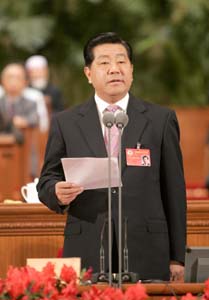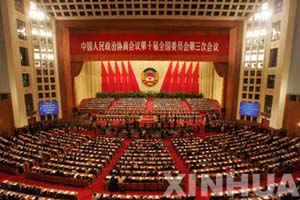|
Top advisory body concludes annual session
(Xinhua)
Updated: 2005-03-12 16:57
China's top advisory body, the National Committee of the Chinese People's Political Consultative Conference (CPPCC), concluded its annual full session Saturday afternoon, vowing to better serve the country's peaceful reunification and the building of a "harmonious society".

Jia Qinglin, chairman of the National Committee of the Chinese People's Political Consultative Conference (CPPCC), chairs the closing ceremony of the Third Session of the 10th CPPCC National Committee in the Great Hall of the People in Beijing March 12, 2005. [Xinhua] |
"All CPPCC National Committee members shall unite with all forces that can be united..., contribute to the building of a harmonious socialist society..., and promote the development of cross-Straits relations and the motherland's peaceful reunification," urged Jia Qinglin, chairman of the CPPCC National Committee, in his speech at the closing meeting of the 9.5-day session.
All top Party and state leaders, including President Hu Jintao,top lawmaker Wu Bangguo and Premier Wen Jiabao, were present at the closing meeting, which began at 3 p.m. in the Great Hall of the People in downtown Beijing.
As usual, the 2,110 advisors participating in the closing meeting voted to adopt a "political resolution", a written document reflecting the consensus they have reached after numerous rounds of panel discussions, voicing their full support to the enactment of an anti-secession law aimed at preventing Taiwan's secession from China.
The National People's Congress (NPC), China's top legislature, is expected to vote on the adoption of the law Monday when it concludes its annual full session in Beijing.
"Formulation of the anti-secession Law embodies our persistent stand to seek peaceful reunification of the motherland with utmostsincerity and greatest efforts, and manifests the common aspiration and firm determination of the entire Chinese people to safeguard national sovereignty and territorial integrity and neverto allow 'Taiwan independence' secessionist forces to secede Taiwan from China in any name or by any means," said the resolution.

The closing ceremony of the Third Session of the 10th National Committee of the Chinese People's Political Consultative Conference (CPPCC) is held in the Great Hall of the People in Beijing March 12, 2005. [Xinhua] |
Also at the closing meeting, the advisors elected Tung Chee Hwa,chief executive of the Hong Kong Special Administrative Region whoon Thursday formally announced his resignation request to the central government, Zhang Meiying and Zhang Rongming as new vice chairpersons of the CPPCC National Committee.
The three new CPPCC leaders were invited to take seats at the front row of the central rostrum immediately after the election.
The advisors also adopted several other resolutions, respectively regarding the work of the Standing Committee of the CPPCC National Committee over the past year, the handling of and feedback to the proposals and suggestions they put forth at last year's full session, and the examination and acceptance of their proposals this year.
Proclaiming the "complete success" of the session, Jia said the once-a-year gathering of the advisors has been "democratic, truth-seeking, united and progressive", resulting in "fruitful outcomes."
"We shall earnestly study and implement the important guidelines set forth by the Communist Party of China (CPC) Central Committee regarding the building of a harmonious socialist society," he said.
According to Jia, a harmonious socialist society refers to a society that features democracy and a rule of law, justice and fairness, honesty and rapport, vitality and stability, as well as a harmonious co-existence between man and nature.
Political advisors nationwide shall also earnestly study and implement the "four-point guidelines" set forth by President Hu Jintao on the development of cross-Straits relations under new circumstances, and unite with all patriotic personages at home and abroad to "resolutely oppose and check 'Taiwan independence' secessionist activities," added Jia.
Founded in 1949, the CPPCC consists of elite members of the Chinese society who are willing to serve as the think tank for the government and for the country's legislative and judicial organs.
As an open forum where the CPC, the country's non-Communist parties and people without party affiliation discuss state affairsfreely and on an equal footing, the CPPCC is also regarded as an ideal interpretation of China's "socialist democracy".
|